Adventures of the British on the Baltic Sea
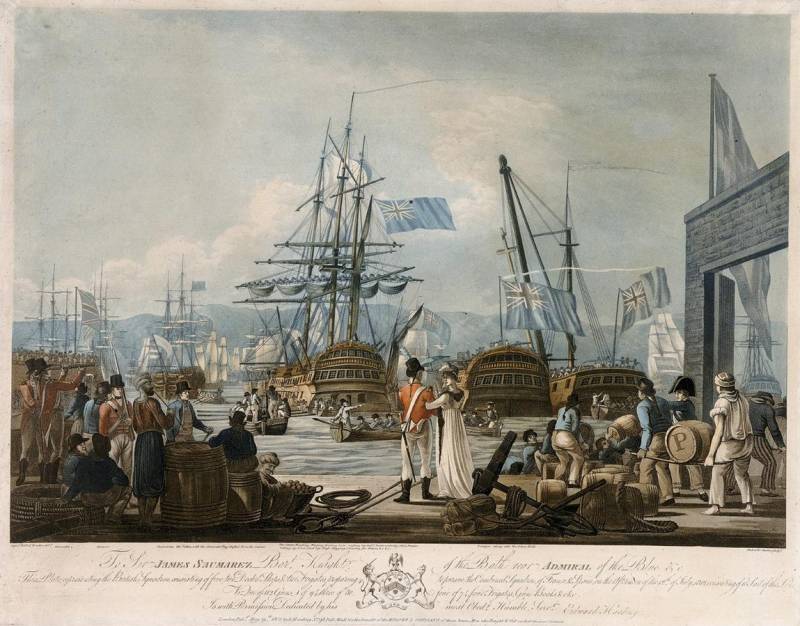
The causes and background of the Russian-Swedish War of 1808–1809 have not yet been fully studied. Russian historiography claims that Russia, as an honest ally of Napoleon after Tilsit, started the war after Sweden refused to join the continental blockade against Britain. Moreover, France, which had taken Pomerania from Sweden a little earlier, only welcomed Russia’s military aspirations and was not even against it if Russia captured all of Sweden along with Stockholm.
However, some researchers point to a completely different background to the events. The Tilsit Peace was received with hostility by both the highest circles in England and the highest circles in Russia. The British were deprived of a strategic product on which everything was literally tied, and the Russians were deprived of profits, and not only profits, but entire sectors of the raw materials industry, because France had its own hemp, flax, wood, iron, etc., and Russian goods she didn't need them.
The throne under Alexander began to shake, and in order not to end his life in the same way as his father Paul I, the emperor decided to start a “small victorious war.” The goal was to conquer Finland and reduce Sweden to the level of a minor Baltic power.
On February 5, 1808, a courier was sent to the Russian envoy in Sweden with a letter about the start of hostilities on February 10, 1808. But the Baltic is covered with ice in February, so the letter took three weeks to reach Stockholm, and was delivered to the Swedish government only on March 2, that is, 14 days after the Russians started the war. In essence, it was an attack without a declaration of war.
In response, Great Britain allocated 1 million pounds to Sweden and sent its squadron and troops to the Baltic.
“One of our own among strangers...”
Even before the British arrived, the Swedish strategic situation had changed from merely threatening to catastrophic. On February 26, 1808, Russian troops began to cross the border with Finland. The Russian advance was slow for two reasons: firstly, they were only able to recruit 24 thousand bayonets at the initial stage; secondly, the Russians were confident that the Finns would greet them as liberators and that there was no need to make any special efforts.
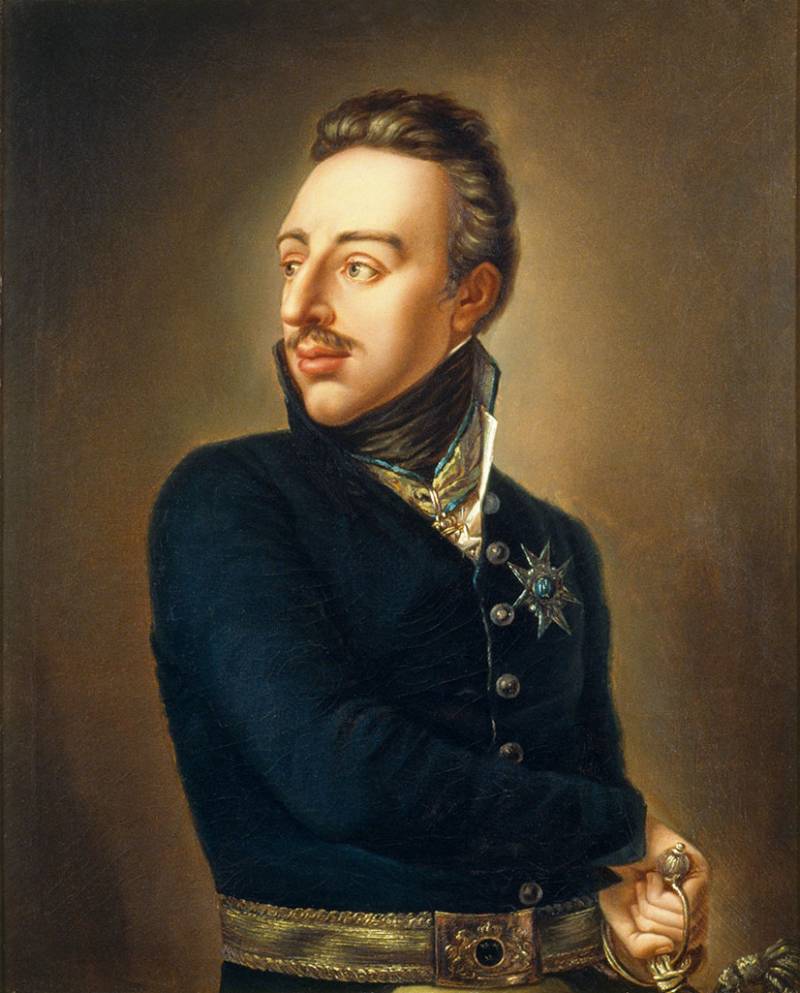
King Gustav IV Adolf of Sweden
The Swedes had much fewer troops in Finland, so General Moritz Klingspor simply cleared all of Southern Finland from Swedish troops, excluding only the Sveaborg fortress. The surprised Russians slowly advanced without fighting, only the terrain and constant raids hindered them. "friendly Finns"they wanted so much "save".
At the same time, Denmark and France declared war on Sweden, and Napoleon ordered Marshal Bernadotte to bring Spanish regiments loyal to the French into Denmark to prepare for the invasion of Southern Sweden.
On May 26, 1808, the British squadron of Vice Admiral James Somarets arrived in Gothenburg, consisting of the 98-gun Victory (flagship), 74-gun Audacious, Centaur, Implacable, Brunswick, Mars, Orion, Goliath, Vanguard, Pompee, Superb, 64-gun Dictator, Nassau, Stately and Africa, frigates Africanne, Euryalus, Salsette, Tartar and Tribune, 4 sloops, 3 brig-sloops, 1 bombardment ship and as many as 17 artillery brigs, as well as transport ships with troops (14 thousand bayonets) under the command of a general John Moore.
It didn't all start out very well for the British - the Swedish government was strongly anti-British, and British troops were simply forbidden to land on the shore. Colonel James Murray was urgently sent to Stockholm, who returned four days later and locked himself in Moore's cabin for a serious conversation. In that conversation, Murray bitterly said that, apparently, the Swedish king Gustav IV was a little crazy, and even with the habits of a despot. The army doesn't like him and fights carelessly. It should be noted that Murray’s characterization was clearly subjective; a little lower we will see that the king spoke about completely reasonable and normal things, which, however, contradicted the vision from London.
On March 22, the Russians took Abo, where the Swedish galley fleet was stationed, without a fight. In order to prevent the Russians from capturing the ships, all of them (almost 50 combat units) were burned at the piers.
Having laid all this out, Murray gave Moore a letter from Gustav IV, in which the Swedish king welcomed the British, but objected to the landing of the British corps and prohibited it with his authority.
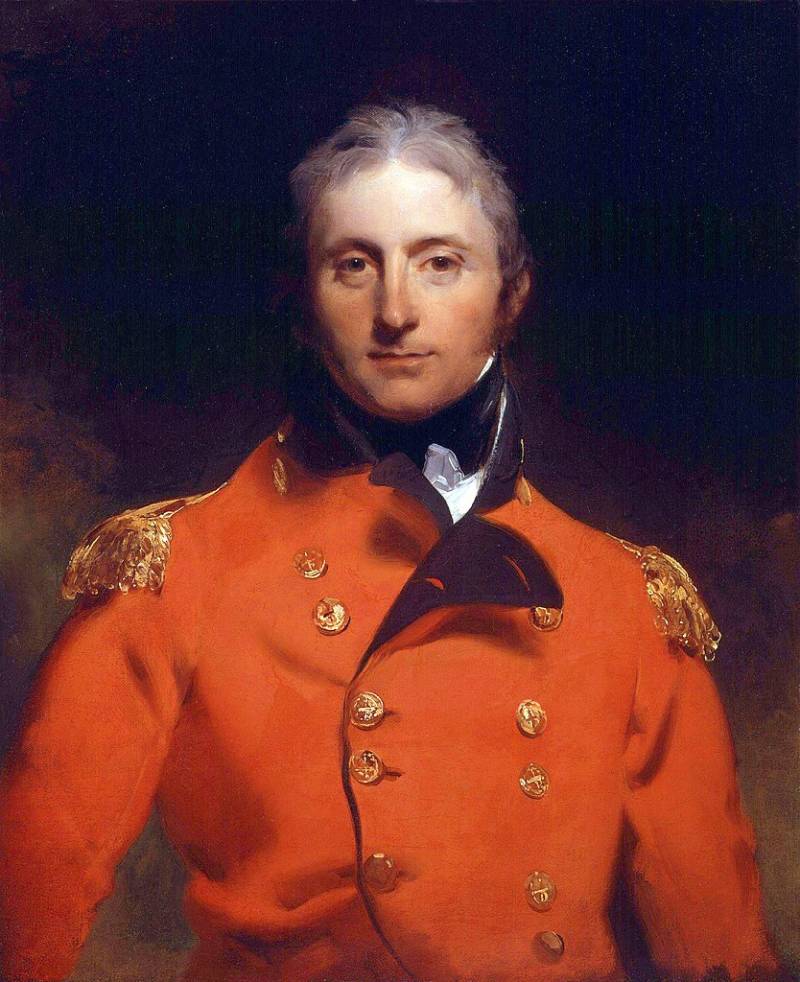
General John Moore.
The problem was this. The Swedes really needed help, but in the war with Russia. Moore, according to instructions received from British Foreign Secretary George Canning, insisted on active military action against Denmark, with the goal of capturing the island of Zealand and obtaining an anchorage in the Sounds, that is, controlling the Baltic Straits.
Moore sent the king's letter to London by packet boat and waited for an answer.
Meanwhile, the cramped English troops amused themselves by carrying out exercises on a small island allocated to them near Gothenburg. In the end, the situation became completely confused, and Moore decided to go to Stockholm himself in order to speak with the king.
On June 17, an audience was held where the Swedish king invited Moore to take action against Norway (Norway was then in a union with Denmark), or against the Russians in Finland. Moore was much more interested in the landing in Jutland, that is, the capture of Denmark together with Sweden and control of the Sounds. However, for this, the British corps had to be stationed in Skåne, which Gustav categorically opposed.
The king suggested that Moore, since he so wanted to fight the Danes, organize a series of landings in Norway. Moore refused. Gustav proposed to include the British corps in the Swedish troops, with subordination to him, the king. Moore did not agree to this either. And then Gustav lost his temper and asked directly - what use are you then? And he further said that Sweden has quite enough troops, so Stockholm does not need the services of the British corps.
On June 23, Gustav sweetly asked when Moore and his troops were going to return to England? As a result, on July 3, the general and his troops left the shores of Sweden and 12 days later arrived in the Downs to find his glory and death in Spain.
Facing the threat of defeat
The completely unexpected collapse of the Swedish resistance in Finland was a clear sign of a deep political crisis at court between the king and the nobles. Despite slogans and proclamations about love for the motherland and loyalty to the crown, the mood quickly spread in Sweden that the struggle was useless and nothing could be changed.
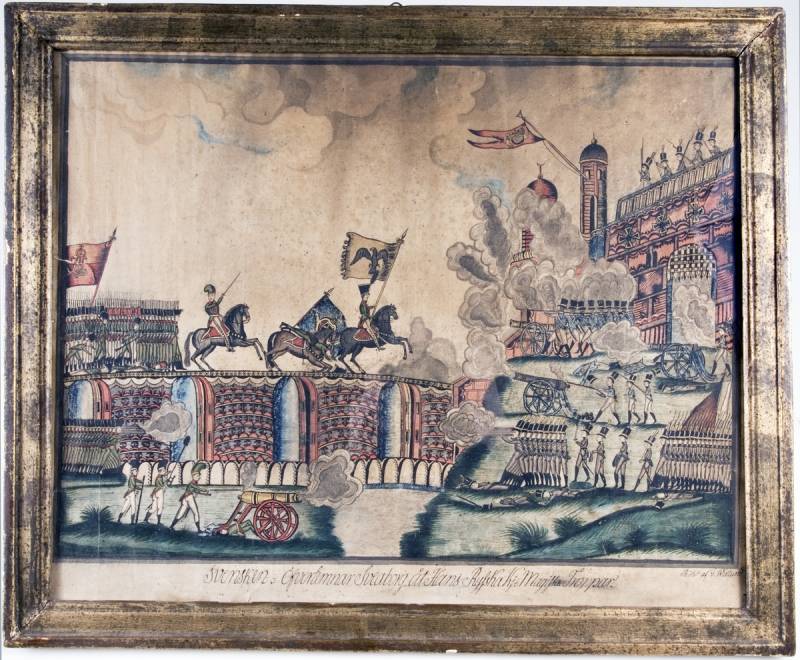
Surrender of Sveaborg.
In this situation, even the anti-British party welcomed British supplies weapons and materials, however, simultaneously scolding London for their inadequacy and slowness.
Suffering constant defeats in the east, in April-May 1808 Gustav IV turned his attention to Norway. On the face of it, it was reckless and strategically unjustifiable, but the Russian advance in Finland stalled and the Danes were still waiting for the arrival of Bernadotte's corps to begin planning an invasion of southern Sweden.
Gustav proposed using the troops stationed at Skåne to attack Norway. There, according to the king, it was necessary to carry out a blitzkrieg, and then transfer them to southern Finland to attack the Russians. In general, Gustavus was truly an unusual ruler, and part of Murray’s words in Moore’s description of the king was true. The king, having Russian troops in Finland, continued to act in the same paradigm - Bernadotte's French troops arriving in Denmark? This means that we will fight with Denmark, even if at this moment we lose Finland.
Gustav demanded an annual subsidy of 2,8 million pounds from England, and also expected that British troops would take part in the capture of Norway. Canning agreed to a subsidy of only 1 million pounds and the sending of 30 thousand muskets with all the necessary ammunition to arm the Swedish army. The offensive was to be led by the Royal Lieutenant General Moritz Armfelt.
Initially, indeed, the Swedish troops acted successfully and were even able to capture part of the province of Christiania, but the Norwegians started a guerrilla war, the Swedish movement soon came to naught, and then the Swedes completely retreated back to their territory. As a result, Gustav accused Armfelt of incompetence, and the general in turn accused the king of lack of coordination and refusal of British military support.
On May 6, Sveaborg also fell. Eric Hornborg in the book "When the Empire Collapsed" (När riket sprängdes) Sveaborg describes the surrender as follows:
This gang was supported by a bunch of officers’ wives who feared all the vicissitudes of the assault and subsequent plunder of the city...”
The city had supplies for a year's siege, a garrison of 6 people and 000 guns. There, unlike Abo, the Russians captured the rest of the galleys fleet Sweden, as well as supplies of hemp, canvas, timber and provisions.
In total, the Swedish skerry fleet lost more than 230 combat units without any fighting, and by the summer of 1808 there were only 70 artillery sloops.
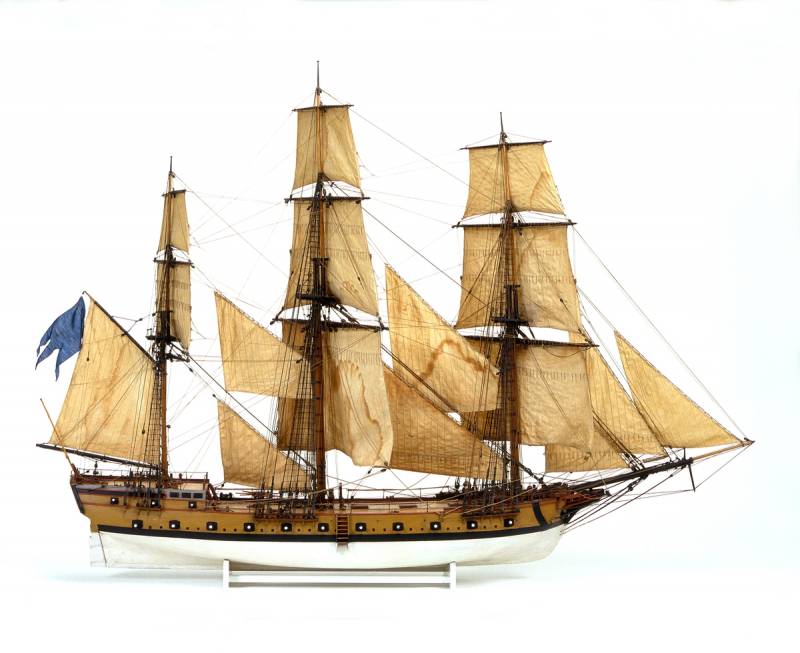
Swedish rowing frigate - gemamm.
But if there was no happiness, then misfortune would help. Since May, Russian troops in Finland began to suffer defeats. It was a matter of both the talented Swedish generals who arrived at the front and the stretched nature of Russian communications. In April, the Swedish army defeated the Russians in the battle of Siikajoki; in May, the Russian garrisons were driven out of Gotland and the Åland Islands.
It was in this situation that Somaretz's fleet arrived in Sweden on May 26, 1808.
"A stranger among his ..."
James Somaretz was a fierce individualist, an aggressive naval officer, often intolerant of other people's opinions. It is even enough to cite the fact that Somarets managed to quarrel with Nelson before the Battle of Abukir, for which after the battle he was slowed down in his career, not receiving the rank of rear admiral.
Having become a vice admiral only in 1806 and choosing between command of a squadron in the Indian Ocean or the Baltic, he chose the latter option. Before sailing, Somarets received slightly confusing and contradictory instructions: to restore the blockade of Danish Jutland, to prevent the landing of enemy troops in Sweden, to attack Russian ships if “they behave aggressively,” to monitor the situation in Finland, to prevent the Russians from landing troops in Sweden and protect British and Swedish trade in the Baltic. There was another order - unofficial - to facilitate smuggling with Europe and Russia in every possible way, thereby collapsing the continental blockade.
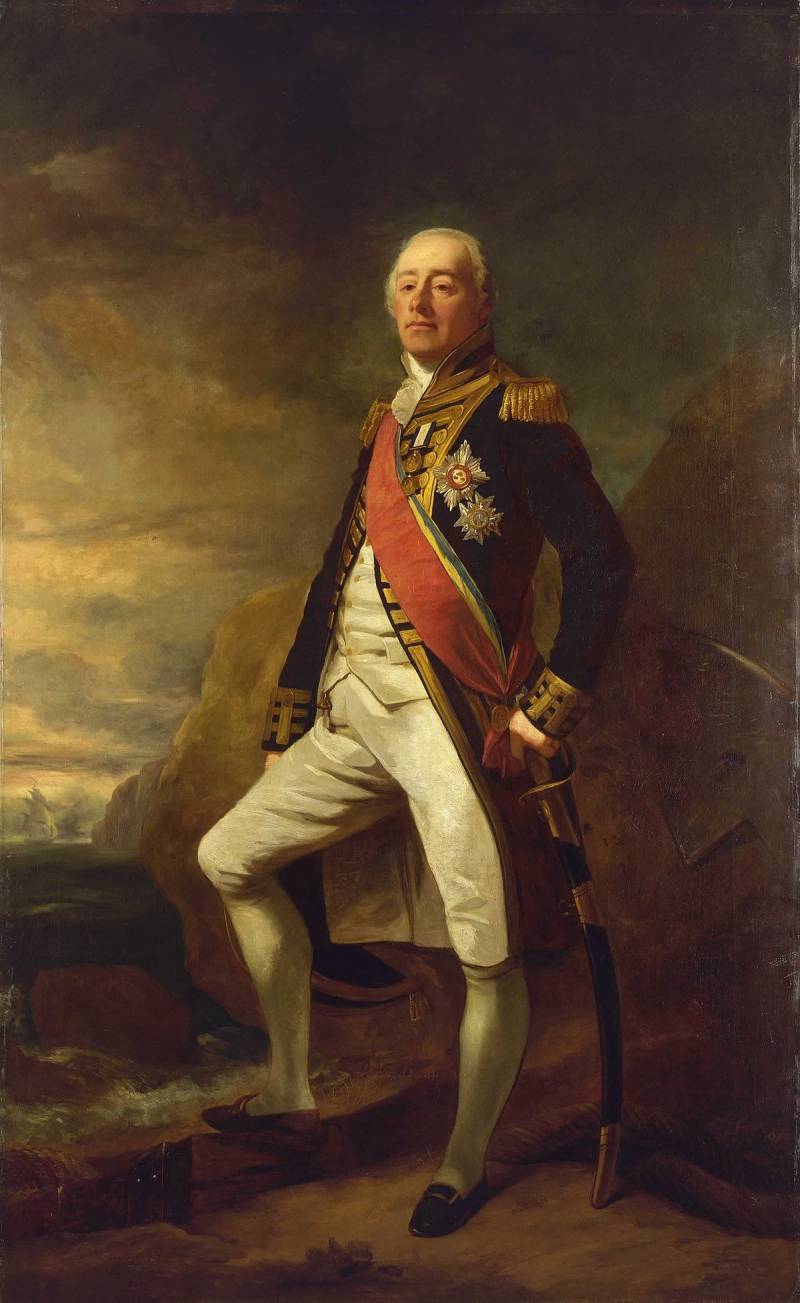
Admiral James Somaretz.
The Swedish fleet, despite the presence of 10 battleships and 6 frigates, acted passively; moreover, by the summer some of the ships required repairs. The Swedes were lucky only in that the Russian fleet, nominally having 27 ships in service, was able to put to sea fewer than the Swedes - only 9 ships and 7 frigates. The Swedes turned to the British for help. Somar, tied up with tasks off the coast of Denmark, sent only the 74-gun Centaur and Implacable to their aid, which, however, together were able to drive away the Russian squadron and even destroy the Russian battleship Vsevolod.
The Russians retreated in disarray to the Baltic port, where two English ships blocked them for four days until the Swedes and other English ships arrived. The blockade was disrupted by a scurvy epidemic on Swedish ships, and it was lifted on August 30, 1808.
However, the main problem was that the British Foreign Office sincerely believed that Russia had interests in the Baltic that were completely similar to England, and put the possible re-signing of an alliance with Russia much higher than a real alliance with Sweden. This was greatly facilitated by the Anglophobia of Gustav IV, who was never able to find a common language with both Somaretz and Moore, which led to the emergence of secret correspondence between the English admiral and the Russian Tsar, which even included congratulations to Alexander for the quick capture of Finland ( !) and regret about the surrender of Senyavin’s squadron in Lisbon.

The British squadron leaves the harbor.
Leaving for England in the fall of 1808, Somarets left a small squadron of Rear Admiral Keats in Sweden. In Sweden itself, after the Finnish failures, discontent was brewing. In October 1808, Gustav IV, angry at the surrender of Sveaborg, decided to deprive three regiments of the guard rank as punishment for their timid actions against the Russians, which, among other things, sharply reduced the salaries of soldiers and officers. Also, according to this decree, all the privileges that they had before were removed from the gentlemen officers.
It is clear that the offended officers immediately joined the opposition.
Coup
The new British ambassador to Sweden, Anthony Merry, arrived in Stockholm with instructions that England would support Sweden's withdrawal from the war with Russia provided that Sweden did not enter into a system of continental blockade and left its ports open for trade. At the same time, Cannig discussed the possibility of overthrowing Gustav IV from the throne, but after mature reflection these plans were abandoned.
In turn, Gustav began to demand increased subsidies from Great Britain (they were talking about doubling payments), blackmailing him with breaking and joining the continental blockade and creating an alliance with Denmark, which would generally block England’s access to the Baltic.
The English residents immediately declared the Swedish king to be violently insane, but do not forget that in the XNUMXth–XNUMXth centuries those rulers whose policies did not suit someone were most often accused of insanity (King Christian VII of Denmark, King George III of England, Russian Tsar Paul I). Rather, it was about the egocentrism of the Swedish monarch, who actually did not master the art of compromise. Moreover, subsequent events made many suspect the use of the “long English arm” in the Swedish events.
In general, in the winter of 1808, some of the regiments were deprived of the rank of guards, and this led to the creation of a conspiracy led by the former commander of the Western Army, Baron Carl Gustav Armfelt. Armfelt was made a scapegoat for the failure of the invasion of Norway and was sent into retirement, which did not suit the baron at all. Armfelt, not being a fool, through his former deputy, Colonel Georg Adlersparre, began to seek contact with the British envoy.
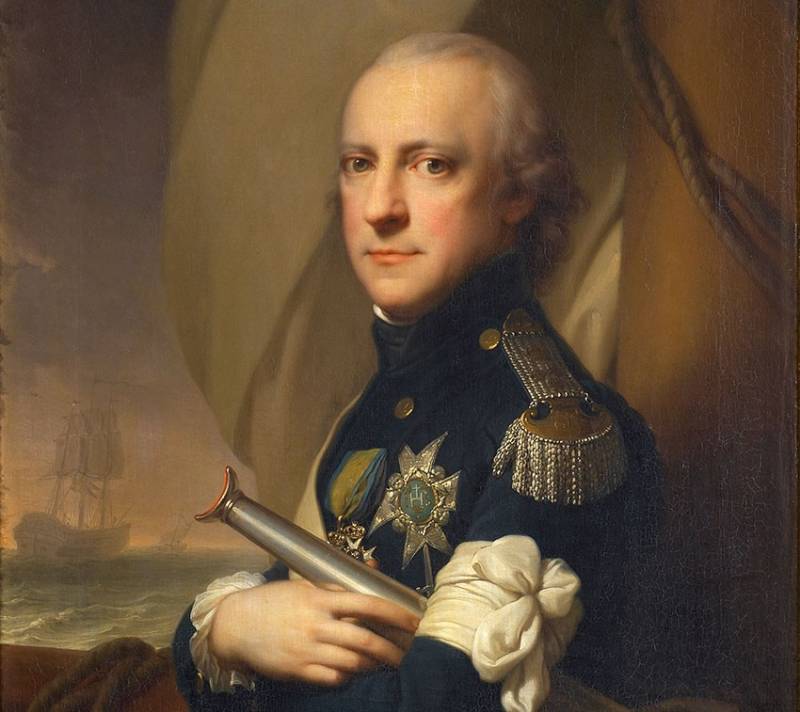
Duke Karl of Södermanland
On March 5, 1809, Gustav IV issued a memorandum, where, probably for the first time in his life, he praised Napoleon and called for ending the war with Russia.
Adlersparre contacted the Danish commander in Norway, Prince Christian of Augustenburg (promising him the Swedish crown), who... allocated a regiment of soldiers (800 people) to the conspirators to overthrow "mad king". With this force, the conspirators moved towards Stockholm.
In response, the king mobilized the city garrison and imposed a state of siege in the capital, closing the gates. But the basis of the defense of Stockholm was made up of precisely those regiments that were “demoted” as a result of the campaign of 1808, and the soldiers, together with the officers, simply began to defect to the side of the rebels.
In desperation, Gustav IV turned to Anthony Merry with a request to send English troops to protect the capital and money to pay the troops. In response, he heard that England is not going to and does not want to interfere in the internal affairs of Sweden, and you, dear king, come on, sort it out yourself.
It is clear that Gustav declared the British supporters of the conspirators, but let's be honest - England took a neutral position. Yes, this neutrality was beneficial to the rebels, but nothing more. As for the squadron of Rear Admiral Keats, he actually supported Gustav and even promised to allocate him a combined marine regiment of 400 people after March 17.
However, on March 13, the rebels approached the capital, having more than 3 people in their ranks. The king had 000 men, and he could not rely on their loyalty. Inside the royal palace, discord was in full swing; some members of the Swedish government demanded that Gustav renounce the crown.
It all ended with the king’s personal guard arresting him and putting him under house arrest on March 15th. It is clear that in this situation Keats did not send any marines.
Gustav tried to escape, was caught and taken into custody in Gripsholm. On March 29, 1809, the king abdicated the throne.
Charles of Zedermanland became the regent, and at the ensuing Riksdag he was offered the crown - on June 6, 1809, he was crowned under the name of Charles XIII, and the same Christian of Augustenburg, who allocated troops for the coup, was proclaimed heir to the throne (crown prince).
Aftermath
Charles XIII immediately tried to revive the Anglo-Swedish treaty and the first thing he did was demand subsidies from Canning. The new first minister, Lars von Ingeström, began negotiations with a demand to recognize Charles XIII as the rightful king of Sweden and to pay Stockholm 1 million pounds.
Cannig, who still hoped to win Russia over to his side, refused both requests from the Swedes. In August 1809, Charles XIII was recognized as the legitimate king, but no money was allocated, and the Swedes tried to launch a final offensive in Finland in order to turn the tide.
Approximately 7 soldiers were put on English ships in order to land in Southern Finland and, at a minimum, carry out sabotage, and at a maximum, occupy some important city - Abo or Turku. However, the Swedish corps landed by Somarets was intercepted near the villages of Ratan and Sevar and was actually defeated in one blow.
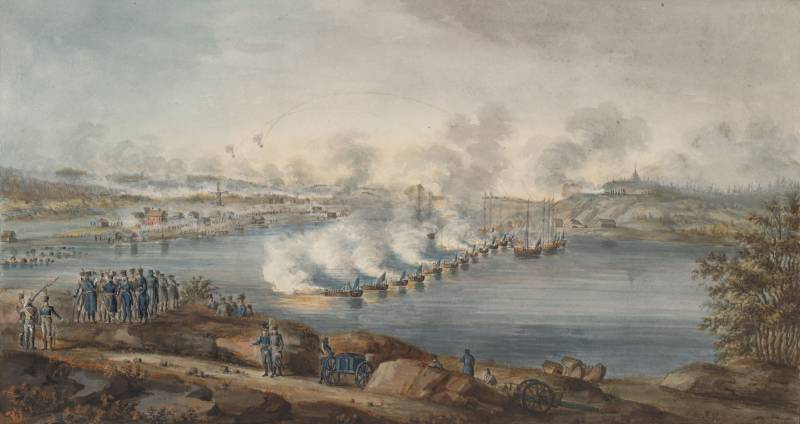
Battle of Ratan.
The remnants of the Swedish corps retreated to the coast, hoping for help from the fleet, but Somarets' squadron had already retreated, and the Swedish fleet simply refused to go to save the army. Von Gegerfelt's detachment, consisting of the frigate Jarramas and several gunboats, who arrived to help, was mistaken by the Swedes for Russians and fired upon. As a result, the ships withdrew, and the remnants of the corps surrendered to the mercy of the Russians.
On September 17, all of Finland was surrendered to the Russians. The Swedes lost one third of their population and their economy. But at the same time, to the surprise of the British, Russia did not demand that Sweden join the continental blockade, which led the English consul August Forest to the idea that Sweden would continue to trade with Britain, moreover, Russia would also trade through Swedish ports with London under a false flag.
Somarets wrote:
It is clear that the coup and subsequent political leapfrog deprived Sweden of even a shadow of the opportunity to win the war with Russia. In addition, with the appointment of Baron Gustav Lagerbjelke, an ardent Anglophobe and admirer of Napoleon, as Minister of Foreign Affairs, the Anglo-Swedish alliance also collapsed.
The new head of the Foreign Ministry called on Napoleon to put pressure on Russia and ensure the return of Finland, but... Napoleon affectionately wished Sweden to quickly make peace with Russia on Russian terms. Out of despair, Lagerbjelke rushed into the arms of London, but the British took a “no peace, no war” position regarding Sweden, pondering the new reality.

Sweden's territorial losses following the war of 1808–1809.
In March, Russian troops occupied the Åland Islands, threatening landings in the vicinity of Stockholm, which led Sweden to the need to make peace with Russia on any terms.
According to the agreement concluded on September 17, 1809 in Friedrichsham, all of Finland, including the Åland Islands, as well as Lapland, ceded to Russia.
The English Baltic Fleet, despite its successful actions, could neither prevent the Russian conquest of Finland nor neutralize the threat of a Russian invasion of Sweden itself. Well, the detachment of Rear Admiral Keats, left in Sweden for the winter of 1808–1809, was unable to help Gustav IV retain the throne.
References:
1. Leveson-Gower, Granville "Private Correspondence: 1781–1821", vol. 2 – John Murray (Publishers) Ltd., 1916.
2. James Carrick Moore "The Life of Lieutenant-General Sir John Moore, KB", vol. 2 – TheClassics.us, 2013 (reprint).
3. Eirik Hornborg “När riket sprängdes: fälttågen i Finland och Västerbotten 1808–1809” – Stockholm: Norstedt, 1955.
4. “Nordisk familjebok”, 2nd edition, section “Karl XIV Johan”, 1910.
5. Christer Jorgensen “The Anglo-Swedish Alliance Against Napoleonic France” – Palgrave Macmillan London, 2004.
6. William James, “The Naval History of Great Britain: 1808–1811” – Harding, Lepard, and Company, 1826.
7. David John Raymond “The Royal Navy in the Baltic from 1807–1812” – Florida Tate University, 2010.
Information